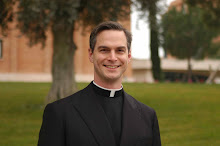
Q: Father John, I have been praying (mental prayer) for a long time. But lately I seem to be experiencing dryness in my prayer - I just don't seem to get as much out of it as I used to. Is the "dark night of the soul"? If not, what's going on, and what should I do?
A: The Catechism (#2371) mentions dryness as one of the most common obstacles to prayer. But this is one of those terms that can be used in many different ways. It will take more than one post to answer your question, so let's begin at the beginning, with a definition.
When we say that we experience "dryness" in prayer, we usually mean that we don't sense God's presence, or we don't sense it as much as we think we should, or as much as we would like. We naturally expect that we will experience a certain level of consolation when we come into contact with God. This usually takes the form of positive emotions: when we meditate on Christ's mercy, we experience a feeling of relaxation in our soul, a release of tension, because we recognize once again that we don't have to earn God's love, and that we can't lose it; when we meditate on God's grandeur we are filled with the elation that flows from perceiving something beautiful - as if we were watching a dramatic sunset over the ocean; when we meditate on God's omnipotence, we feel a certain awe and security, a confidence that fills the soul with a sense of peace; when we meditate on Christ's tireless zeal for those in need, we feel a surge of vitality and a keen, sweet desire to do great things for the Church and lead others into friendship with Christ... These emotional responses to our encounter with God are intense and deep. They give us a sense of satisfaction that we don't find elsewhere, and in so doing, God hopes to draw us closer to him and increase our commitment to his Kingdom and his will.
But consolation can also come in other forms. It can be found in the imagination. At times, as we meditate on a scene from the Gospel, or as we gaze meditatively upon a crucifix or an icon, we can experience a kind of perfect harmony between the scene we are looking at and the attention of our mind. It's as if everything suddenly came into focus. It's as if our visual and imaginative capacities are suddenly in perfect synch with our understanding, which also just so happens to be in perfect synch with God's truth. This is similar to what athletes experience when they get "in the zone." We are free from distractions, our memory is perfectly in order, and during this consolation we ourselves and our whole personal world seem to be in high-definition harmony with the glance of God.
Consolation can also be experienced at the level of the intellect and will. The emotions and the imagination are more directly connected to our sense faculties (sight, sound, touch, taste, smell) than the spiritual faculties of intellect and will. The intellect is what enables us to know true things in the abstract (dogs know their masters' commands, but they don't reflect on and write poems about them, as we do). The will is what enables us to choose good things freely (in a sense, squirrels may choose one nut over another, but it's only by instinct, whereas people can choose even to go against their instinct, as when the martyrs refuse to denounce Christ even under torture). When in our prayer these two faculties come into contact with God, who is Truth itself and Goodness itself, we experience an even deeper sense of satisfaction and fulfillment than we do through emotional and imaginative consolation.
These experiences of consolation (of the emotions, the imagination, and the spiritual faculties) are like whiffs of heaven. They draw us toward God and guide us along the steep and narrow path of Christ. When they diminish or disappear, we experience "dryness in prayer."
So much for definitions. Next time we will examine two possible causes of this dryness, and that will lead us into the last part of the answer, "What should I do?"
Yours in Christ, Fr John Bartunek, LC


No comments:
Post a Comment
Dear Friends - If you wish to submit a question to Father John, please see the "How can submit a question" post for guidelines. Your comments and feedback are more than welcome!